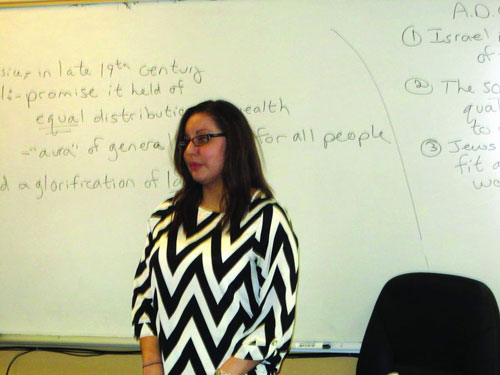.jpg) Usually one thinks of learning as something that happens in the classroom, but students at Ma’ayanot Yeshiva High School for Girls in Teaneck, NJ recently received an important life-lesson on organ donation in an assembly organized by the school’s Athletics Director, Eileen Schwarz. Schwartz, who is passionate about the subject, intended for her students to learn two important lessons: that organ donation saves precious lives, and that, if done under the guidance of the Halachic Organ Donor Society (HODS), organ donation is permitted under Jewish law.
Usually one thinks of learning as something that happens in the classroom, but students at Ma’ayanot Yeshiva High School for Girls in Teaneck, NJ recently received an important life-lesson on organ donation in an assembly organized by the school’s Athletics Director, Eileen Schwarz. Schwartz, who is passionate about the subject, intended for her students to learn two important lessons: that organ donation saves precious lives, and that, if done under the guidance of the Halachic Organ Donor Society (HODS), organ donation is permitted under Jewish law.
To make the point about saving lives, Schwartz invited Gabriella Palmer, a 21-year-old resident of Paterson, NJ, to speak with Ma’ayanot seniors. Unfortunately, Ms. Palmer has firsthand experience on the topic of organ donation as she was the recipient of a liver transplant seven years ago, when she was just 14 years old.
Ms. Palmer, who as a teen was a competitive swimmer, explained that her life-altering journey began as she was training for the 2008 Beijing Olympics. “Suddenly, while participating in a swim meet at Rutgers, I had a severe asthma attack and was rushed to a local hospital.” That happened on March 17, 2006, and Palmer confessed to not remembering much of what happened next. What she does know, however, is that she emerged from a second hospital more than a month later with a donated liver. She is also painfully aware of the fact that what occurred during that lost month brought her to the brink of death.
Ms. Palmer explained that the first hospital that treated her misdiagnosed her condition and overmedicated her to the point of causing acute liver failure. Eventually she was transferred to Columbia Presbyterian in New York City, where she and her parents were given the grim news that she would likely die within 48 hours without a liver transplant. “I was placed at the top of all transplant lists in the United States and Canada” Palmer explained. Thankfully, they quickly received news of a potential donor who was a perfect match in upstate New York.
“From the time that the donor’s family was contacted until the time that my transplant surgery was complete was only 18 hours,” Palmer told the students. “If he had not been an organ donor [on his license], and if his wife didn’t believe in organ donation, I probably wouldn’t be here today.”
While Palmer’s post-surgery journey has been difficult, she has suffered two bouts of rejection and was treated for PTLD—a type of lymphoma unique to transplant recipients—she remains upbeat about life and relishes the opportunity to share her experiences. “People are asked, when they get their drivers’ licenses if they want to be donors, but most people don’t really think about it. It is important to create awareness.”
For Schwartz, awareness is not enough. “I brought Gabriella to speak with our students because I want every student in the building to know that the possibility of halachic organ donation exists, and to seriously consider becoming a donor.”
Students reacted to the program with serious enthusiasm. Tamar Landsman of Teaneck, NJ noted that “sometimes we see these cases on TV and assume they cannot possibly happen, so this was definitely a reality check.”
Chedva Weissler of Tenaeck agreed. “It was eye opening because you always hear about people who donate their organs or people who need a transplant. But to see how real and intense the whole process is made us realize how important it is to donate.”
Elise Rosenthal of Edison, NJ was particularly grateful to learn about HODS. “I always was interested in becoming a donor, but hearing and seeing a real-life experience made me that much more sure that it is something I want to do. Knowing that there is an Orthodox organization that allows and helps with the process makes me feel even more secure about my decision.”
It appears that both Palmer and Schwartz can be assured that their lessons were well-learned.
Readers interested in learning more about the Halachic Organ Donor Society can visit their website at www.hods.org.
By Pam Ennis











